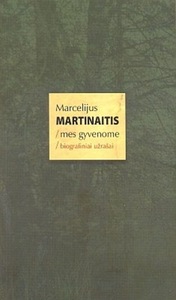MARCELIJUS MARTINAITIS: “WE LIVED” 0
Interview about the book of biographical notes of M.Martinaitis “We Lived”*
Simona Siderevičiūtė
Did the youth experiences of our grandfathers differ from experiences of childhood and youth of the present generation? Marcelijus Martinaitis tells about the period, which is history to present youth already, in his book of biographical notes “We Lived”. The writer, who shared his recollections in the book, commented them and answered questions that appeared while taking turns in the past described in the book.
Did you apply some criteria according to which you selected recollections presented in the book?
No, I had nothing to select from early childhood or teenage years. It was important to me to write about things I saw and experienced then, how I lived then. What can you select from your childhood? Another thing is whether I succeeded to render all this?
Did you have some doubts that readers could misunderstand some personal experiences due to their subjectivity?
I never think about it, especially when I write poems. No creation is possible without subjectivity, even such texts as my memoirs. What is the meaning to write if you have no personal experience, which may appear boring or impossible to understand to some persons?
What does the plural form of the book “We” mean?
It is the communal concept of a person. I have not heard that a country-side inhabitant would say “I live”. It was a different kind of communal lifestyle, which is hardly understandable today: almost nobody could survive on one's own or without one's family, relatives, neighbours. This is why I wanted to write about the world which no longer existed and in which younger people would not be able to live. We are different already.
You use the past tense: “We lived”. The present disappears in such formulation, it becomes non-authentic, loses meaning. An impression appears while reading the book that you felt the source of “real happiness” in the past, in life full of shortage. Is there something to rejoice about in present? How would you describe the present period?
I have not yet written about things which gladden me today. I am glad about many things, only my joy is slightly different. Something has been said by poems. Much has been said in my book. People knew how to enjoy life in my childhood, in the hard war and post-war years, they even amused themselves despite the terrible shortages!
I wanted to state by my book that the happiness of a human being did not depend on goods seen on windowsills or things he/she was able to buy. What is the reason that the number of suicides increased at the time Lithuania started enjoying the so wanted happiness “to have”; meanwhile, as far as I remember, only one person killed himself in our parish in the old times. Many people of today feel lonely, despite the fact that they are surrounded by so many people, things and entertainment.
Perhaps the longing for the country-side and its life appeared only due to the craving to mythologize the country-side? The memory is always more beautiful than reality.
Is country-side really mythologized? It is felt as some emotional or perhaps historical heritage. My village, as it was, is no longer present, and nobody will restore it. I would not like to live in it myself. I wrote the book in order to honour people of my village who knew how to live in the hardest period; also, to honour parents who raised me at the time of great deprivations. There is no nostalgia or mythologizing here.
The value of life does not depend on whether you drive a car or a cart pulled by a horse. I was and still am concerned with the question of value of life rather than with the country-side only. I believe, somebody understands it as he/she reads my book.
Also, it is nice to remember some things, especially youth, in a beautiful way. No escape: with years those days, although they could be very hard, become more and more beautiful. You will live and see.
* Marcelijus Martinaitis. We Lived: Biographical Notes. – Vilnius: Lithuanian Writers' Union Publishers, 2009. – 224 p.

